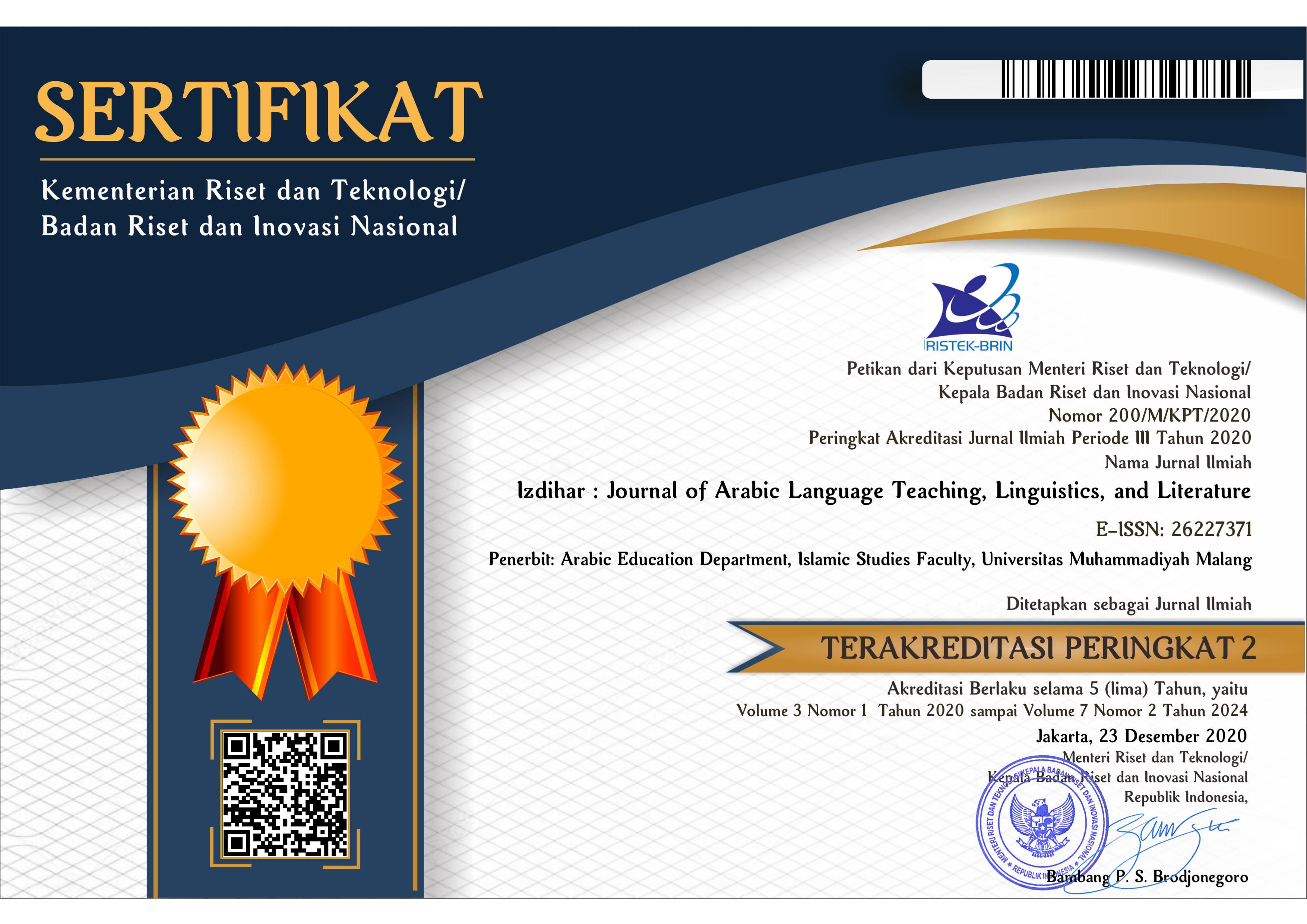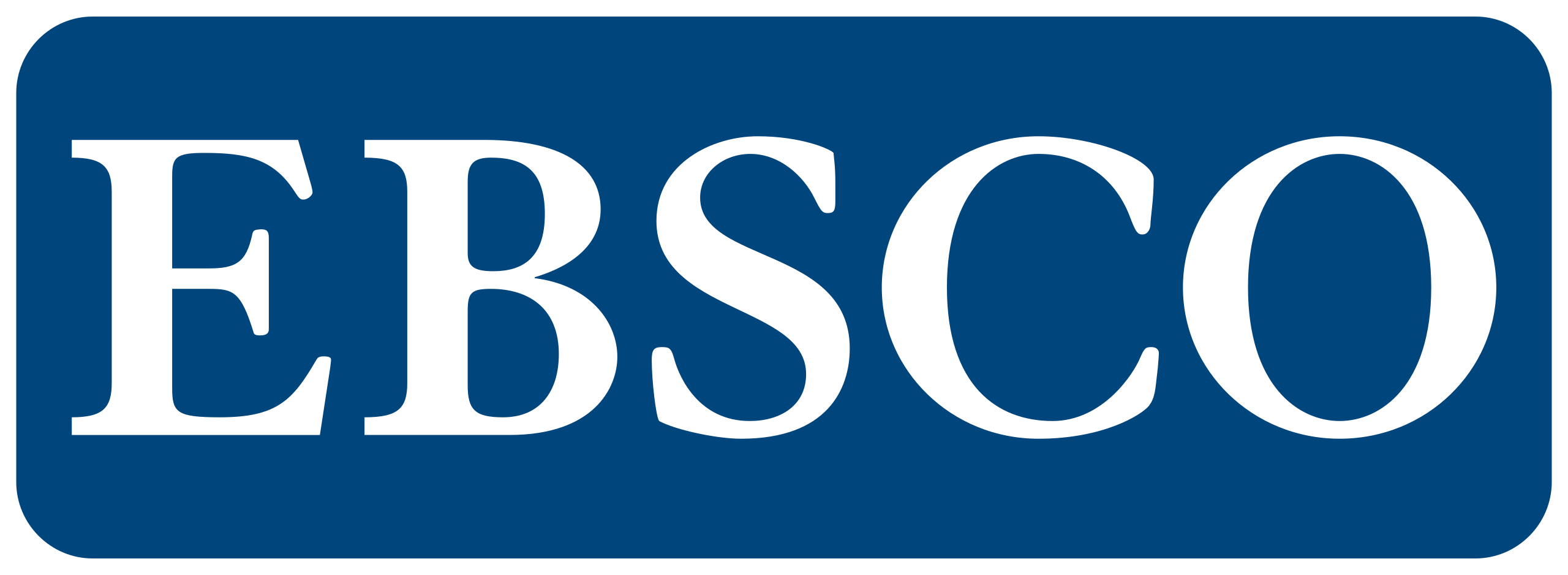Teachers’ Trends in Teaching Arabic in Elementary Schools
DOI:
https://doi.org/10.22219/jiz.v4i2.16875Keywords:
Curriculum, Teaching Arabic, Teaching Techniques, TrendAbstract
This study aims to describe the teachers’ trends in teaching Arabic in elementary schools in terms of goal orientations and teaching techniques. The research data was collected from 52 Arabic teachers using a questionnaire and interviews. The data was analyzed using the interactive techniques of Miles and Huberman. The results of the study show that in relation to the goal orientation, the teachers give priority to the mastering of vocabulary (34.6 %), followed by speaking (25 %), reading (23.1 %), and the last is writing, listening, and translating (1.9 %). This fact indicated that their goal orientations have not led to the expected goals as stated in the curriculum. This study also shows that their techniques in teaching Arabic have various patterns based on their main goal orientations that did not follow the standard of teaching techniques as suggested by the Arabic education experts. The results of this study indicate that teachers’ lack of competence in teaching Arabic in elementary schools.
Downloads
References
Arifuddin, I.S. (2015). Peranan guru terhadap pendidikan karakter siswa di Kelas V Sdn 1 Siluman. Pedadidaktika: Jurnal Ilmiah Pendidikan Guru Sekolah Dasar, 2(2), 175–186. https://ejournal.upi.edu/index.php/pedadidaktika/article/view/5844
Akmaliyah, Hudzaifah, Y., Ulfah, N., & Pamungkas, M. I. (2021). Child-friendly teaching approach for Arabic language in nn indonesian islamic boarding school. International Journal of Language Education, 5(1), 501–514. https://doi.org/10.26858/IJOLE.V5I1.15297
Albantani, A. M., (2018). Pembelajaran bahasa Arab di Madrasah Ibtidaiyah: Sebuah ide terobosan. Attadib Journal Of Elementary Education, 3(2), 160–173. https://doi.org/10.32507/attadib.v2i2.417
AlFauzan, Abdurrahman bin Ibrahim. (2011). Idha’at Li mu’allimi al-lughah al-arabiyah li ghairi al-nathiqin biha. Fahrasah Maktabah al-Malik Fahd al-Wathaniyah
AlHudaibi, Ali Abdul Muhsin. (2015). Dalil mu’allim al-arabiyah li al-nathqin bi ghairiha. Markaz al-Malik Abdullah bin Abdul Aziz al-Dauli
AlUshaili, Abdul Aziz Ibrahim. (2002). Tharaiq ta’lim al-lughah al-arabiyah li al-nathqin bi lughat ukhra. Fahrasah Maktabah al-Malik Fahd al-Wathaniyah
Arsana, I. K. S. (2020). Pengaruh keterampilan mengajar guru dan fasilitas belajar terhadap motivasi belajar siswa. Sosial Horizon: Jurnal Pendidikan Sosial, 6(2), 269. https://doi.org/10.31571/sosial.v6i2.1294
Asmawati. (2003). Pengaruh kinerja guru terhadap hasil belajar. Pedagogy, 2(1), 44–53. http://dx.doi.org/10.30605/pedagogy.v2i1.659
Badrus, M. (2018). Pengaruh motivasi mengajar guru terhadap prestasi belajar siswa pada mata pelajaran pendidikan agama Islam: Studi di SMA Mardi Utomo Kecamatan Tarokan Kabupaten Kediri. Intelektual: Jurnal Pendidikan Dan Studi Keislaman, 8(2), 143–152. https://www.ejournal.iai-tribakti.ac.id/index.php/intelektual/article/view/706
Darmadi, H. (2015). Tugas, peran, kompetensi, dan tanggungjawab menjadi guru profesional. Jurnal Edukasi, 13(2), 161–174. http://dx.doi.org/10.31571/edukasi.v13i2.113
Dewi, R., & Khotimah, S. H. (2020). Pengaruh profesionalisme dan disiplin kerja guru. Elementary Islamic Teacher Journal, 8(2), 279–294. http://dx.doi.org/10.21043/elementary.v8i2.7839
Fahrurrozi, A. (2014). Pembelajaran bahasa Arab : Problematika dan solusinya. Arabiyat: Jurnal Pendidikan Bahasa Arab Dan Kebahasaaraban, 1(2). https://doi.org/10.15408/a.v1i2.1137
Fathony, F. (2019). Pengaruh Metode Tanya Jawab Terhadap Hasil belajar siswa di SMK Negeri 1 Peranap Kabupaten Indragiri Hulu. Jurnal Pendidikan Tambusai, 3(1), 88–98. https://doi.org/10.31004/jptam.v3i1.206
Fransiska, C. (2016). Pengaruh kompetensi profesional guru terhadap kualitas proses pembelajaran pada paket keahlian administrasi. Jurnal Office, 2(2), 108–116. https://doi.org/10.26858/jo.v2i2.2935
Hamalik, Oemar. (2008). Manajemen Pengembangan kurikulum. PT. Remaja Rosda Karya
Hamid, Hamdani. (2012). Pengembangan Kurikulum pendidikan. CV Pustaka Setia
Hizbullah, N., & Mardiah, Z. (2015). Masalah Pengajaran bahasa Arab di Madrasah Aliyah di Jakarta. Jurnal Al-Azhar Indonesia Seri Humaniora, 2(3), 189. https://doi.org/10.36722/sh.v2i3.145
Hudelson, S. (1991). EFL teaching and children: A Topic-based approach (the English teaching forum). Arizona State University.
Idi, Abdullah. (2014). Pengembangan kurikulum teori dan praktik. Rajawali Press
Kirom, A. (2017). Peran guru dan peserta didik dalam proses pembelajaran berbasis multikultural. Al Murabbi, 3(1), 69–80. http://jurnal.yudharta.ac.id/v2/index.php/pai/article/view/893
Laili, H. (2017). Pengaruh metode pembelajaran terhadap kemampuan mahasiswa dalam menerapkan model-model pembelajaran pada perkuliahan strategi pembelajaran matematika. Fondatia: Jurnal Pendidikan Dasar 1(2), 131–149. https://doi.org/10.36088/fondatia.v1i2.106
Maesaroh, S. (2013). Peranan metode pembelajaran terhadap minat dan prestasi belajar pendidikan agama Islam. Jurnal Kependidikan, 1(1), 150–168. https://doi.org/10.24090/jk.v1i1.536
Mardiyah, T. (2017). Problematika pembelajaran bahasa Arab di Madrasah Tsanawiyah Pesantren Sabilil Muttaqien (MTs. PSM) Tanen – Rejotangan - Tulungagung. Perspektiva 10(2). 20-45. http://ejournal.kopertais4.or.id/mataraman/index.php/perspektif/article/view/3317
Miswari, M. (2018). Peningkatan profesionalisme guru bahasa Arab : Upaya peningkatan. Ta'dib 15(2), 255-272. https://doi.org/10.19109/td.v15i02.75
Munthe, Bernawi. (2009). Desain pembelajaran. Pustaka Insan Madani
Murati, R. (2015). The role of the teacher in the educational process. The Online Journal of New Horizon in Education, 5(2), 75–78. https://www.tojned.net/?pid=showissue&issueid=143
Nuridin, N., Jupriyanto, J., & Frastika, R. A. (2019). Pengaruh keterampilan mengajar guru terhadap aktivitas belajar siswa SD Negeri 04 Loning. Jurnal Ilmiah Pendidikan Dasar, 6(1), 45. https://doi.org/10.30659/pendas.6.1.45-51
Prihatini, E. (2017). Pengaruh Metode Pembelajaran Dan Minat. Jurnal Formatif 7(2), 171–179. http://dx.doi.org/10.30998/formatif.v7i2
Rindu, I., & Ariyanti, A. (2017). Teacher’s role in managing the class during teaching and learning process. Script Journal: Journal of Linguistic and English Teaching, 2(1), 83. https://doi.org/10.24903/sj.v2i1.77
Sanjaya, Wina. (2010). Kurikulum dan Pembelajaran. Prenada Media Group
Sari, N. R., & Yulhendri, Y. (2020). Pengaruh peran guru dalam proses pembelajaran dan intensitas belajar terhadap hasil belajar siswa kelas X IPS SMA Negeri 5 Padang pada mata pelajaran ekonomi tahun ajaran 2018/2019. Jurnal Ecogen, 3(1), 61-73. https://doi.org/10.24036/jmpe.v3i1.8526
Scott, W. A. and Ytreberg, L. H. (2014). Teaching English to children. Pearson Education.
Suwardi, I., & Farnisa, R. (2018). Hubungan peran guru dalam proses pembelajaran terhadap prestasi belajar siswa. Jurnal Gentala Pendidikan Dasar, 3(2), 181–202. https://doi.org/10.22437/gentala.v3i2.6758
Wahida, B. (2017). Problematika pembelajaran bahasa Arab (studi kasus terhadap problematika metodologis pembelajaran bahasa Arab di IAIN Pontianak ). Jurnal Al-Astar STAI Mempawah, 7(1), 43–64.
Wardani, K., Pitoewas, B., & Nurmalisa, Y. (2013). Pengaruh sikap dan perilaku guru pada saat mengajar di kelas. Jurnal Kultur Demokrasi, 53(9), 1689–1699. http://jurnal.fkip.unila.ac.id/index.php/JKD/article/view/4653
Werdayanti, A., & Belakang, L. (2008). Pengaruh kompetensi guru dalam proses belajar mengajar di kelas dan fasilitas guru terhadap motivasi belajar siswa. Dinamika Pendidikan, 3(1), 79–92. https://doi.org/10.15294/dp.v3i1.434
Downloads
Published
How to Cite
Issue
Section
License
Copyright (c) 2021 ABDUL HARIS RIFAI, MD. Qutbuddin, Ahmad Fatoni, Izdihar : Journal of Arabic Language Teaching, Linguistics, and Literature

This work is licensed under a Creative Commons Attribution-ShareAlike 4.0 International License.
Copyright Notice
Authors who publish with this journal agree to the following terms:
- Authors retain copyright and grant the journal right of first publication with the work simultaneously licensed under a Creative Commons Attribution-ShareAlike 4.0 International License that allows others to share the work with an acknowledgment of the work's authorship and initial publication in this journal.
- Authors are able to enter into separate, additional contractual arrangements for the non-exclusive distribution of the journal's published version of the work (e.g., post it to an institutional repository or publish it in a book), with an acknowledgment of its initial publication in this journal.
- Authors are permitted and encouraged to post their work online (e.g., in institutional repositories or on their website) prior to and during the submission process, as it can lead to productive exchanges, as well as earlier and greater citation of published work (See The Effect of Open Access).
Copyright (c) 2019 Izdihar : Journal of Arabic Language Teaching, Linguistics, and Literature

This work is licensed under a Creative Commons Attribution-ShareAlike 4.0 International License.

















